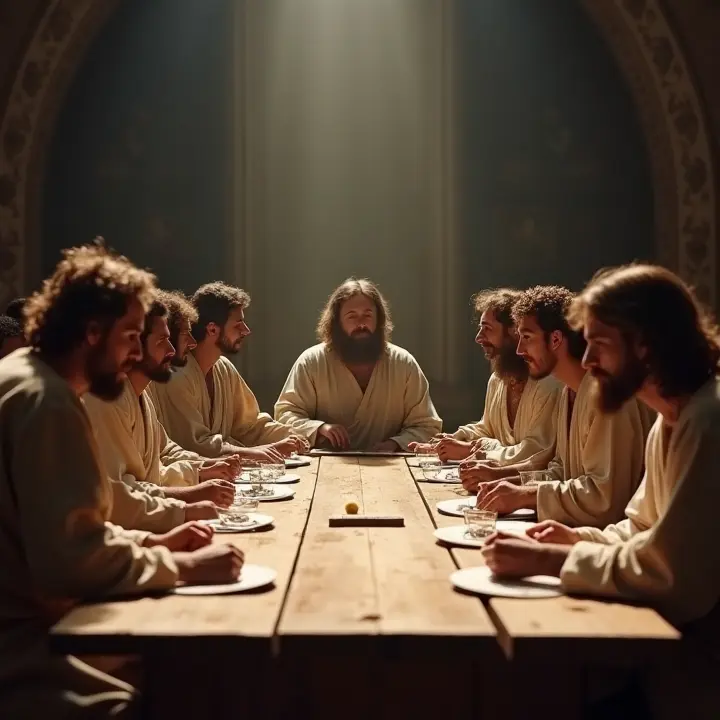The Last Supper is one of the most significant events in the Bible, chronicled in the Gospels of Matthew, Mark, Luke, and John. It is a poignant moment that captures the essence of Jesus’ final days on earth, his relationship with his disciples, and the profound spiritual truths he imparted. This event is not only a cornerstone of Christian theology but also a rich tapestry of human emotion, divine revelation, and eternal significance.
On the evening before his crucifixion, Jesus gathered with his twelve disciples in Jerusalem to celebrate the Passover meal. This annual feast commemorated the Israelites’ liberation from slavery in Egypt, a story of redemption and divine intervention. However, this particular Passover would take on a new and profound meaning. As the disciples reclined around the table, Jesus introduced elements that would forever transform the significance of this meal.
Matthew 26:20-23 recounts how Jesus began the evening by addressing a somber reality: “While they were eating, he said, ‘Truly I tell you, one of you will betray me.’ They were very sad and began to say to him one after the other, ‘Surely you don’t mean me, Lord?’ He replied, ‘The one who has dipped his hand into the bowl with me will betray me.'” This moment was fraught with tension and uncertainty. The disciples, who had followed Jesus through thick and thin, were now confronted with the shocking revelation that one of their own would betray him. The atmosphere was heavy with questions and a sense of impending doom.
Yet, the Last Supper was not merely a time of sorrow. It was also a moment of profound spiritual teaching. Jesus took the Passover meal and imbued it with new meaning. As recorded in Luke 22:19-20, “And he took bread, gave thanks and broke it, and gave it to them, saying, ‘This is my body given for you; do this in remembrance of me.’ In the same way, after the supper he took the cup, saying, ‘This cup is the new covenant in my blood, which is poured out for you.'” These words transformed the ordinary elements of bread and wine into symbols of his sacrificial death. The Last Supper became the first celebration of the Eucharist, sacram aent that would be observed by Christians for centuries to come.
The Gospel of John provides a unique perspective on this event. Chapters 13 to 17 delve into the intimate and emotional interactions between Jesus and his disciples. One of the most memorable moments is when Jesus washed the feet of his disciples. This act of humility was a powerful demonstration of servant leadership. As John 13:14-15 states, “Now that I, your Lord and Teacher, have washed your feet, you also should wash one another’s feet. I have set you an example that you should do as I have done for you.” Jesus, the Son of God, stooped to perform a task usually reserved for the lowliest of servants. Through this act, he taught his followers the importance of humility and service.
Moreover, the Last Supper was a time of intense emotional farewell. Jesus knew that his time on earth was drawing to a close, and he wanted to impart final instructions and blessings to his disciples. In John 15:9-12, he said, “As the Father has loved me, so have I loved you. Now remain in my love. If you keep my commands, you will remain in my love, just as I have kept my Father’s commands and remain in his love. I have told you this so that my joy may be in you and that your joy may be complete. My command is this: Love one another as I have loved you.” These words encapsulate the essence of Jesus’ teachings¡ªlove, obedience, and unity.
The Last Supper also foreshadowed Jesus’ impending betrayal and crucifixion. After the meal, Jesus and his disciples went to the Garden of Gethsemane, where Jesus prayed in agony, seeking strength to face the cross. This moment of deep spiritual struggle is recorded in Matthew 26:36-46, “Then Jesus went with his disciples to a place called Gethsemane, and he said to them, ‘Sit here while I go over there and pray.'” Here, Jesus faced his greatest trial, yet he remained steadfast in his commitment to fulfill his Father’s will.
The Last Supper is a multifaceted story that weaves together themes of betrayal, love, sacrifice, and divine purpose. It is a narrative that has resonated through the ages, inspiring countless works of art, music, and literature. From Leonardo da Vinci’s masterpiece to the solemn observances in churches worldwide, the Last Supper remains a powerful reminder of Jesus’ final days and his enduring message of love and redemption. It is a story that invites us to reflect on our own lives, our relationships, and our commitment to the values Jesus taught. As we remember the Last Supper, we are reminded that through Jesus’ sacrifice, we are offered the hope of eternal life and the promise of a new covenant.

